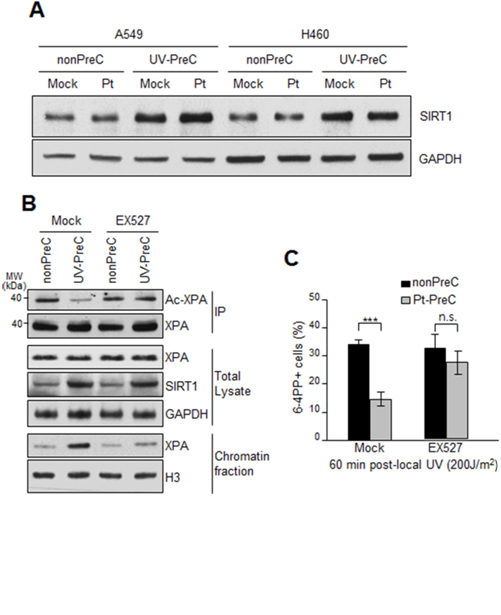글로벌 연구동향
방사선생물학
 Enhanced nucleotide excision repair capacity in lung cancer cells by preconditioning with DNA-damaging agents.
Enhanced nucleotide excision repair capacity in lung cancer cells by preconditioning with DNA-damaging agents.동아대/ 최지예, 박정민,이주미, 임선희, 강태홍*
- 출처
- Oncotarget
- 등재일
- 2015 Sep 8
- 저널이슈번호
- 6(26):22575-86.
- 내용

대표그림
(A) 항암제-내성 폐암 세포에서 관찰된 SIRT1의 과발현. (B) SIRT1에 의해 증대된 XPA의 탈아세틸화가 SIRT1 저해제 처리시 감소. (C) SIRT1 저해제 처리시 암세포의 DNA 회복 능력 감소.
Abstract
The capacity of tumor cells for nucleotide excision repair (NER) is a major determinant of the efficacy of and resistance to DNA-damaging chemotherapeutics, such as cisplatin. Here, we demonstrate that using lesion-specific monoclonal antibodies, NER capacity is enhanced in human lung cancer cells after preconditioning with DNA-damaging agents. Preconditioning of cells with a nonlethal dose of UV radiation facilitated the kinetics of subsequent cisplatin repair and vice versa. Dual-incision assay confirmed that the enhanced NER capacity was sustained for 2 days. Checkpoint activation by ATR kinase and expression of NER factors were not altered significantly by the preconditioning, whereas association of XPA, the rate-limiting factor in NER, with chromatin was accelerated. In preconditioned cells, SIRT1 expression was increased, and this resulted in a decrease in acetylated XPA. Inhibition of SIRT1 abrogated the preconditioning-induced predominant XPA binding to DNA lesions. Taking these data together, we conclude that upregulated NER capacity in preconditioned lung cancer cells is caused partly by an increased level of SIRT1, which modulates XPA sensitivity to DNA damage. This study provides some insights into the molecular mechanism of chemoresistance through acquisition of enhanced DNA repair capacity in cancer cells.
Author information
Choi JY1, Park JM1, Yi JM2, Leem SH1, Kang TH1.1Department of Biological Science, Dong-A University, Busan, Korea.2Research Center, Dongnam Institute of Radiological & Medical Sciences, Busan, Korea.
- 키워드
- SIRT1; XPA; chemoresistance; nucleotide excision repair
- 연구소개
- 시스플라틴 항암제에 내성을 띠는 폐암 세포에서 탈아세틸화 효소(Deacetylase)인 SIRT1이 과발현 되고, 이로인해 NER (뉴클레오티드-절삭 회복, Nucleotide excision repair)의 핵심인자인 XPA의 탈아세틸화가 촉진됨으로써 NER 활성이 증대됨을 확인함. 또한 SIRT1에 대한 특이적 저해제를 처리하여 NER을 저하시킴으로써 항암제-내성 폐암세포를 효과적으로 사멸시킬 수 있음을 확인함. 결론적으로 본 연구에서는 암세포의 항암제 내성 기전에 관여하는 DNA Repair 활성을 통제함으로써 효율적인 암치료법 개발이 가능함을 제시함.
- 덧글달기









